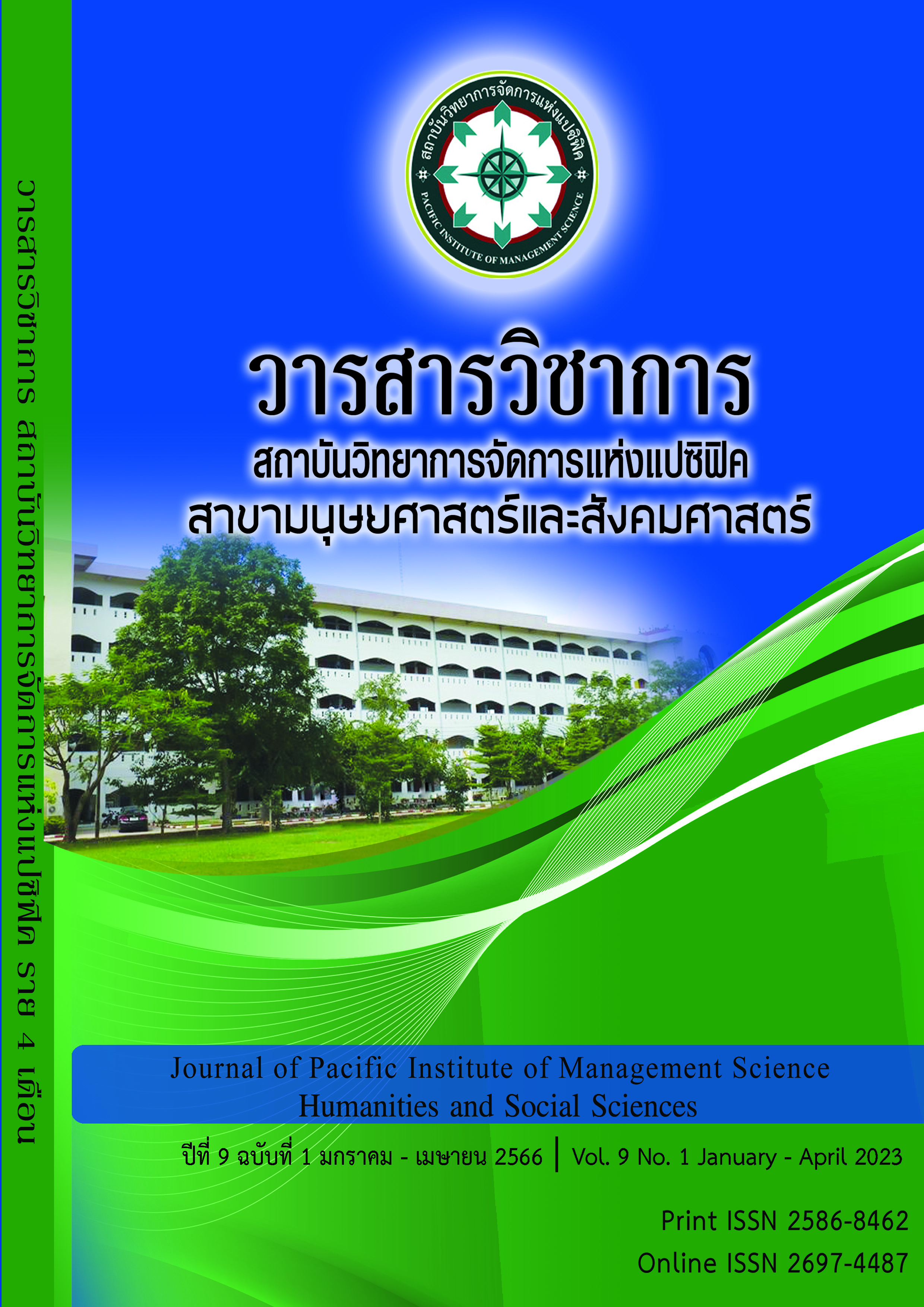Communication Strategies, Opportunities, and Needs to Develop Business Brand of Souvenirs Shops in the Eastern Region through Facebook Platform According to The Eastern Economic Corridor: EEC and Buddhist Principles
Keywords:
communication strategy, facebook platform, souvenir shop business brand development, Buddhist principlesAbstract
This research aimed to study communication strategies, perspectives, opportunities, needs, and Buddhist principles application in the business brand development of a souvenir shop in the eastern region through Facebook platform according to the project of the Eastern Economic Corridor: EEC. The researcher used qualitative research methods; starting from researching the document. The researcher collected data from the souvenir shop's Facebook platform of 36 cases, had in-depth interviews with a group of 15 souvenir shop business entrepreneurs and arranged group discussions of souvenir shop business owners in 3 groups of 7 people each, totaling 21 people. The results of the study showed that the sample group used communication strategies through Facebook focusing on posting time, content, post’s engagement, inbox messages, profile pictures, pictures, videos, live broadcasts and customers’ reviews. For the opportunity to develop a souvenir shop business brand, it was found that the sample group saw the opportunities to develop their brands from the project of Eastern Economic Corridor: EEC. In addition, it was found that the sample group wanted to develop a branding strategy, using multiple platforms, content marketing and networking with government support. For Buddhist principles, that souvenir shop entrepreneurs adhere to as the basis of successful business running and brand developments are the Four Sangahavatthus and the Four Secular Principles.
References
กันตนา ทองอินทร์. (2559). การนำเอาหลักคำสอนของศาสนาพุทธมาใช้ในการบริหารของนักธุรกิจ ในภาคตะวันออกเฉียงเหนือ. วารสารการบริหารท้องถิ่น 8 (1) : 16-26.
ธนาคารกสิกรไทย. (2566). EEC ตัวช่วยสำคัญดัน SME ธุรกิจไทยโต [ออนไลน์]. สืบค้นเมื่อ 9 มีนาคม 2566. จาก https://www.kasikornbank.com/th/business/sme/ksmeknowledge/article/ksmeanalysis/pages/eec-sme.aspx.
พระเดชา กิตฺติโก (โชติธราธรรม). (2556). การบริหารงานบุคคลตามหลักสังคหวัตถุ 4 ของ ผู้บริหารโรงเรียนธรรมภิรักษ์ เขตบางพลัด กรุงเทพมหานคร. วิทยานิพนธ์พุทธศาสตรมหาบัณฑิต สาขาพระพุทธศาสนา. มหาวิทยาลัยมหาจุฬาลงกรณราชวิทยาลัย.
พิษณุ หอมสมบัติ, พระปลัดภัครวัฒน์ สีลเตโช, และสอาด ภูนาสรณ์. (2564). ฆราวาสธรรม 4 ประเภท: การป้องกันการทุจริตอย่างยั่งยืน. วารสารวิชาการธรรมทรรศน์. 21 (2) : 161-165.
สำนักงานเพื่อการพัฒนาระเบียงเศรษฐกิจพิเศษภาคตะวันออก (สกรศ.). (2561). ทิศทางและการส่งเสริมการท่องเที่ยวเพื่อพัฒนาเศรษฐกิจและสังคมในพื้นที่ EEC. การสัมมนาและประชุมกลุ่มย่อยเพื่อรับฟังความคิดเห็นต่อ (ร่าง) แผนการพัฒนาและส่งเสริมการท่องเที่ยวในพื้นที่ระเบียงเศรษฐกิจพิเศษภาคตะวันออก. วันที่ 27 กุมภาพันธ์ 2561 สวนนงนุชพัทยาอำเภอสัตหีบ จังหวัดชลบุรี.
พระครูศรีปริยัตยารักษ์. การนำหลักสังคหวัตถุ 4 ไปใช้ในพัฒนาการบริหารจัดการขององค์กร บริหารส่วนตำบล. วารสารธรรมวิชญ์. 2 (2) : 315-321.
Banks, Angella and Haan, Perry. (2017). Facebook and Branding of Small To Medium-Sized Enterprises. Association of Marketing Theory and Practice Proceedings 2017 : 9.
GUMUS, Niyazi. (2017). The effects of social media content marketing activities of firms on consumers” brand following behavior. Academic Research International. 8 (1) : 1-8.
Shen B, Bissell K. (2013). Social Media, Social Me: A Content Analysis of Beauty Companies` Use of Facebook in Marketing and Branding. Journal of Promotion Management. 19 (5) : 629-651.
Downloads
Published
Issue
Section
License
Copyright (c) 2023 Pacific Institute of Management Science

This work is licensed under a Creative Commons Attribution-NonCommercial-NoDerivatives 4.0 International License.
บทความที่ได้รับการตีพิมพ์เป็นลิขสิทธิ์ของ สถาบันวิทยาการจัดการแห่งแปซิฟิค
ข้อความที่ปรากฏในบทความแต่ละเรื่องในวารสารวิชาการเล่มนี้เป็นความคิดเห็นส่วนตัวของผู้เขียนแต่ละท่านไม่เกี่ยวข้องกับสถาบันวิทยาการจัดการแห่งแปซิฟิค และคณาจารย์ท่านอื่นๆในสถาบันฯ แต่อย่างใด ความรับผิดชอบองค์ประกอบทั้งหมดของบทความแต่ละเรื่องเป็นของผู้เขียนแต่ละท่าน หากมีความผิดพลาดใดๆ ผู้เขียนแต่ละท่านจะรับผิดชอบบทความของตนเองแต่ผู้เดียว







